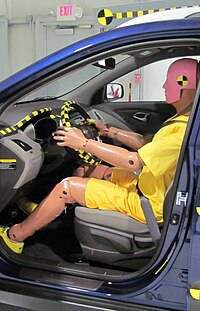
Photo from wikipedia
7558 Background: A low absolute lymphocyte to monocyte ratio (ALC/AMC) has been found to predict decreased survival in lymphoma patients receiving chemotherapy and stem cell transplant. We report its clinical… Click to show full abstract
7558 Background: A low absolute lymphocyte to monocyte ratio (ALC/AMC) has been found to predict decreased survival in lymphoma patients receiving chemotherapy and stem cell transplant. We report its clinical significance and additional cellular phenotype changes in patients receiving chimeric antigen receptor T-cell (CART) therapy. Methods: Records were reviewed for patients (pts) who received axicabtagene ciloleucel between 6/2016 and 12/2020. Receiver operator curve was generated using nominal logistic regression to predict CR as best response. Survivals were calculated using Kaplan- Meier method. Blood immune phenotype were assayed by multiparametric flow. Principle component analysis (PCA) was performed using ClusterVis. Results: Low ALC/AMC (≤0.8) prior to lymphodepletion (LD) chemotherapy on day -5 was associated with lower CR rate (AUC=0.68, Table). Our cohort of 81 pts had similar baseline characteristics except that noted in Table. Low ALC/AMC ratio is associated with shorter EFS and OS (EFS: 2.6 vs. 6.4 months, P<0.0001; OS: 5.3 months vs. not reached, P=0.0006), respectively. Prognostic association remained significant in multivariate analysis including ASCT, bridging therapy and CRP. Interestingly, compared to the high ALC/AMC group, the low ALC/AMC group had decreased CD8 Tem, increased CD16+CCR2+ monocytes and increased monocytes’ producing IL12, IL-10, and IL-1β (n=26). Unsupervised PCA identified 3 clusters: 1. Low ALC/AMC, all non-CR; 2. High ALC/AMC, some non-CR; 3. High ALC/AMC, all CR. Compared to cluster 1 and 2, cluster 3 had increased CD4 Tnaive, CD8 Tcm and IL-17 producing CD4 T and NK cells. Conclusions: ALC/AMC is a clinically accessible test that is strongly associated with CAR-T response and survival. Immune characterization revealed that the biologic effect is not just associated with cell ratio. Increased inflammation has been found to negatively impact CAR-T response, with some cytokines known to be from the myeloid lineage. We show that CRP is elevated in the low ALC/AMC group with increased cytokine production by monocytes. In addition, presence of T cell subset and IL-17 producing cells, before LD, are associated with clinical response. Further investigation on optimizing host immunity may help improve clinical outcome with CAR-T.[Table: see text]